
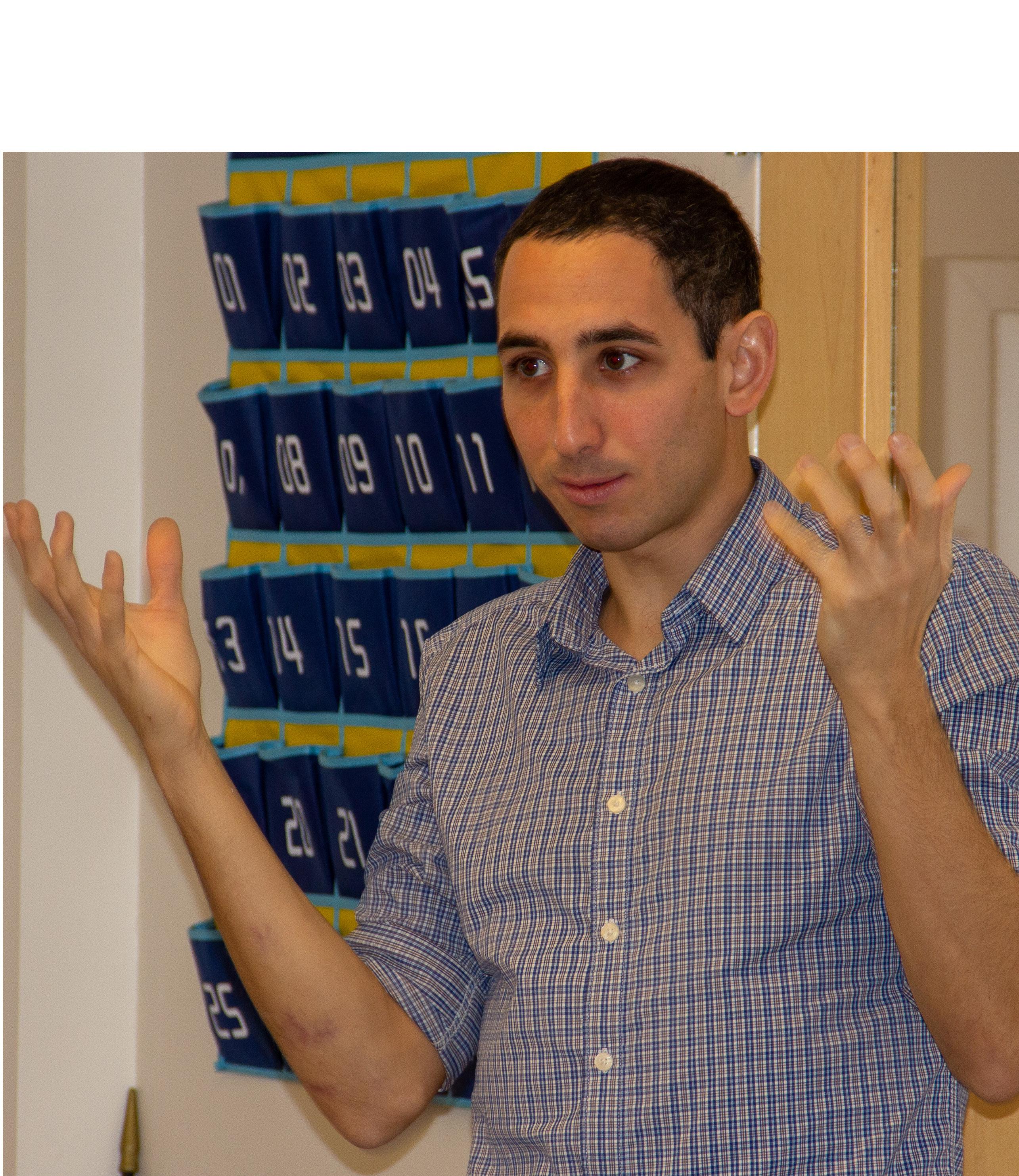
Teacher
Meet
Meet
Meet
A
the
Health Insurance Contributions District-by-district list contributions to your health insurance. Pg. 14
of the Year Teacher of the Year Teacher of the Year 2023 Maine Maine Maine
Matt
Matt
Matt
Conversation with







2 Maine Educator | Winter 2023 Quantities are limited, free titles and number of issues are subject to change; there is a limit of 2 free subscriptions per member, per year. FREE MAGAZINE SUBSCRIPTIONS FOR NEA MEMBERS! AMERICAN ROAD ARCHAEOLOGY BOATING CHRISTIANITY TODAY HARPER’S HOT ROD HOUSTONIA MEN’S HEALTH MOTOR TREND OUTSIDE PORTLAND MONTHLY PROGRESSIVE FARMER THE RED BULLETIN SAN DIEGO MAGAZINE SARASOTA SEATTLE MET ST. LOUIS STORY MONSTERS INK – DIGITAL WINE ENTHUSIAST WOMEN’S HEALTH …AND MORE! GET TWO FREE SUBSCRIPTIONS 4 Thank you for being an NEA Member! NEA Member Benefits is offering our members two FREE subscriptions from the NEA Magazine Service. Select from popular titles including: neamb.com/MEGet2
Editor
Giovanna Bechard
Layout Design Shawn Berry

Leadership
President
Grace Leavitt
Vice President
Jesse Hargrove
Treasurer
Beth French
NEA Director

Rebecca Cole
Board of Directors
District A: Pamela Kinsey
District B: Ally Loukas
District C: Vacant
District D: Cedena McAvoy
District E: Thresa Mitchell
District F: Janice Murphy
District G: Nancy Mitchell
District H: Dennis Boyd
District I: Evelyn Atwood
District J: Rick Beaule
District K: Tom Walsh
District L: Rebecca Manchester
District M: Chris Jones
District O: Lisa Leduc

District P: Dina Goodwin
District R: Gary McGrane
District ESP: Jamie McAlpine Student: Kendrah Willey
Maine Educator (ISSN #1069-1235) is published by:
Maine Education Association 35 Community Drive, Augusta, ME 04330-8005 Phone: 207-622-5866 Fax: 207-888-2070

POSTMASTER: send address changes to:
Maine Educator 35 Community Drive, Augusta, Maine 04330-8005

Non-Profit US Postage paid at Augusta, Maine and additional mailing offices. For advertising
Shawn Berry
35 Community Drive, Augusta, ME 04330 207-622-5866
MAINEEA.ORG 3 CONTENTS | WINTER 2023 VOLUME
NUMBER 2
Staff
83,
Editorial
Managing Editor
Rachelle Bristol
rates and information please contact:
CONTENTS 4 President's Letter 5 From MEA's Executive Director 6 Local Associations Make Major Gains 7 Having Difficult Conversations 8 Teacher Pay Penalty 10 Supporting LGBTQ+ Students 12 Dyslexia 101 14 Health Insurance Contributions 18 Make Your Voice Heard 19 Certification Rule Changes 20 Up in Smoke 23 MEA Bulletin Board 24 Meet Matt - Conversation with the 2023 Maine Teacher of the Year 26 Working For You - MEA Priorities to Improve Schools 28 Read Across America Recommended Books 29 Member to Member: What I'm Reading 30 UMaine System Unified Accredidation: The Big Myth 31 Editor's Note 20 14 24
At a GOTV rally just before Election Day (now in the rearview mirror-thankfully!), the candidate for State House District 95, Mana Abdi, spoke. She has now been elected as a representative from Lewiston—the first Somali-American to hold a seat in our legislature! Just one indication of the forward movement of our state!
She said something that evening that will likely stay with me forever. It was actually something her dentist had said to her, but although I’m sure it referred to a very specific context when she first heard it (teeth), it is applicable in so many ways to our lives: “Take care of the things you want to keep.”
What do you want to keep?
These past few months especially, my attention and energy has been focused on keeping our system of public education strong and on supporting our dedicated educators, despite those who would undermine our efforts and even attack the hardworking people who teach and support our students. After all, at its center, it is the job of not only the MEA President but of all of MEA to support our members, and not just during an election year. I also want to keep our union strong, as I’m sure all our members do as well. During my remaining time serving in this position, and even beyond, I will continue to be committed to do all I can to see that
our members have what they need--to see that you are recognized, respected, and rewarded for the important work you all do—and that our retired educators spent their careers doing. And I will continue to be committed to seeing that the resources are there to be able to do the job of educating Maine’s students well, that our schools and campuses are the safe, welcoming, just, caring, equitable and affirming environments that both educators and students need and deserve.

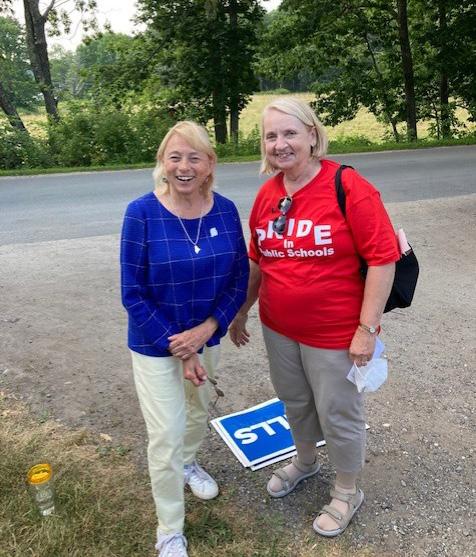
Though November 8th has passed with many successes for those who support public education and educators, we are still faced with many challenges. There is already a look ahead to November 2024. And meanwhile there will be local elections for town and city councils and, so important, for school boards. The challenges didn’t end with these past elections, and we all have a role to play in taking care of the profession we want to keep, in taking care of and participating in the union we want to keep.
Soon local leaders will be getting information about MEA elections— for delegates to the MEA and NEA Representative Assemblies, for seats on the MEA Board of Directors and other important positions. Will you step up to help take care of the Association we want to keep? Are you helping to take care of your local association in any way, big or small, that might help? There are so many ways we each can help take care of our union and our profession!
Of course, we want to also keep strong relationships with our families and friends, and we want to keep our health and welfare, and so we must also be able to take care of the people in our lives, and, not least of all, also take care of ourselves.
At this time of year, the ‘second’ New Year that educators are fortunate to have, I hope we all take to heart what Representative Abdi’s dentist told her— let’s all do our best to take care of the things we want to keep. Let’s keep our public schools and institutions of higher learning strong, let’s keep our union stronger than ever, and let’s all take care of one another.
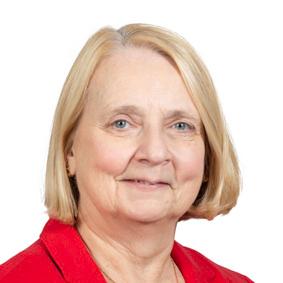
Here’s to a great 2023 for all of you, and for our students!
In Unity, Grace

4 Maine Educator | Winter 2023
207-622-5866 x2200 Grace Leavitt President's Letter - Winter 2023
Grace
Leavitt MEA President
It’s the Most Wonderful Time of the Year
I LOVE the holidays. They are full of tradition, kindness, and good cheer. Some of my best family memories revolve around an evergreen tree with lights and shiny ornaments. We had a family tradition that we would cut down our own tree and let it “air out” as my father used to say in the garage overnight. I was always anxious for the next day to come so we could adorn the tree with years of bad craft projects, colored lights, silver garland, and icicles (those silver strands that you throw on the tree after it is completely decorated). My mother was an avid Christmas junkie and decorated as if her life depended on it. It is also this time of year that her memory and that of my father are never far from my thoughts.

While I miss my parents, I have been very fortunate in my journeys to meet amazing humans who have become like family to me and have reminded me to be grateful for the gifts that are in my life, both year-round and during this time of year. Despite Covid and the impact on all our lives, there are many things to be grateful for this year. While the list is long, I will share a few.
1. My life in Maine
While change is often feared, I see it as opportunity – to grow, to start over, to challenge oneself, to see the world differently, to learn, or to evolve. December 2022 marks the second anniversary of my move to Maine. While I know I will never be a true Mainer for many reasons or so I am told, I am grateful for the opportunities that my new life in Maine has given me. I have been fortunate to meet lots of interesting people and see places with breathtaking beauty. My life here has challenged me to think differently about how I see the world and my place in it. I will forever be grateful for the circumstances that led me here. Thank you to the many folks who have made my life better and welcomed me here despite me being from away.
2. Public education and ALL educators
My parents were staunch supporters of public education, and my mother was the equivalent of an Ed Tech. I was brought up to appreciate the value of a good education and to work hard to take full advantage of the lessons presented to me. I was instilled with a healthy respect for ALL educators which continues to this day and drives my daily work. I am honored to do the work that protects access for all to a quality public education. I have made advocacy for public education and the hardworking educators who tirelessly guide our students my life’s work. I am especially proud to be part of the MEA and to help lead the work to protect, support and advocate for our members and public education. MEA members do amazing things each and every day, and I send my appreciation to all of you.

3. Election results

While this one may seem out of place in relation to the previous two, I am grateful that November
8, 2022, did not go badly for our endorsed candidates. MEA endorsed candidates won their elections in large numbers which is good news for students, public education, and educators. MEA will continue the work we have been doing on behalf of members with some friendly faces and allies. We will pursue making the working and learning environment better for all through positive legislative and policy changes and to make the education profession a place where everyone can see themselves. Not all states faired as well and will face many attacks on professional autonomy, inclusion and equity, and funding. Elections matter and impact the lives of educators daily. What educators earn, what content they can teach, what their pension will be, and many more things are decided by the individuals we send to Augusta and the state legislature.
As we turn the page on another year, I look forward to the future and a new year full of things to be grateful for and adventures to be had. I am grateful for the collaboration and partnerships I have enjoyed this year and look forward to partnering with all of you to keep the promise of a public education for future generations.
I hope you enjoy the people and experiences that you are grateful for this holiday season, and I wish all of you a restful and joyful break.
All the best, Rachelle
MAINEEA.ORG 5
From MEA's Executive
Rachelle Bristol
Director
Rachelle
Bristol Executive Director 207-622-5866 x 2227
Local Associations Make Major Gains
Gorham Contract Wins
Gorham Teachers Association settled a new 3-year contract that increases the base salary over 8.5%, improves the index on the salary scale and maintains 95% health insurance coverage as well as allowing for 12 weeks paid parental leave for any expecting parent (from sick leave) and adding Occupational Therapists to their unit.
Biddeford Wage Increases
Biddeford Educational Technician III and Library Aide's Association secured a new contract with a market adjustment and wage increases averaging over 15% across 3 years.
RSU 19 Teachers Receive Big Raises
Dedication and persistence paid off for teachers in RSU 19 who made significant salary gains of 4.75% in year one, 4% in year two, and 4.2% in year three, all while maintaining their competitive scale structure and strong contract language.
Athens ESP Move from one of the Lowest Paid to one of
the Highest Athens ESP settled a contract with a $3.00/hour raise to the base for all classifications and transitioned from being one of the lowest paid ESP in the UniServ District to now one of the highest.
Jackman Teachers Improve Health Insurance
After a tough negotiation, the local union made significant gains on their health insurance. The Board moved from providing 95% Single Standard 500 Health Insurance to now providing 100% Single Choice Plus Health Insurance.
Fox Island Teacher Association Salary Bump
Across the state, local associations are using collective bargaining to make their lives and their students’ lives better. From pay gains to better health insurance to dealing with inflation, here are some of the more recent contract successes.
The starting salary on the bachelor's scale is now $44,500 for the 2022-23 school year, well above the state required minimum.
Lincolnville Education Association Pay Gains
The beginning salary for bachelor's scale is now $44,853 for the 2022-23 school year. For the 2023-2024 school year the beginning salary for bachelor's scale is $47,899 and for the 2024-2025 school year the beginning salary for bachelor's scale is $51,115.
Lewiston Food Service Inflation Language
The Lewiston Food Service Managers reached a contract settlement providing a 9% increase effective July 1, and 3% increases in the second and third year of the contract. In addition, the contract contains a wage reopener in years two and three if the rate of inflation meets or exceeds 4% in either of those years.
Contract Database Eligible Users:
6 Maine Educator | Winter 2023
CONTRACT
See your local contract along with other contracts from around the state!
individual
eligibility,
ACCESS THE MAINE
DATABASE
Access to the contract database requires
registration, verification of
and the use of a password.
SCAN HERE FOR CONTRACTS SCAN ME
Local Association Presidents, Local Association Chief Negotiators, MEA Board of Directors, MEA Statewide Bargaining Committee member, MEA Staff and MEA RA Delegates.
HAVING DIFFICULT CONVERSATIONS
CRUCIAL TOOLS WHEN THE STAKES ARE HIGH
You’ve likely been there—it's pick-up time and Sam’s mom corners you about why their child continues to get in trouble at school when they behave so well at home. Or your administrator or supervisor tells you to meet them in their office to discuss a recent issue with your work. (side note, you have union rights in this instance-see side bar)
These types of conversations can be stressful, particularly if the person you’re talking with is a difficult individual or your job is on the line.
The following are ways you can navigate these tough conversations so everyone involved receives the answers and information needed while maintaining positive relationships going forward.
Effective Communicators
People who can navigate crucial conversations in difficult situations understand all sides and get those viewpoints into the conversation. Think of all the times you wanted to speak up in a meeting or say something to a parent or your boss but went into “silent mode” because you were afraid you would get in trouble, didn’t want to rock the boat, or just didn’t know how to voice your opinion properly. Now think back, did staying silent ever help your situation?
The answer is likely “no.” Finding a safe space to share and have an open dialogue will put you on the right track. Note the word dialogue—free-flowing conversation between all parties involved is needed.
Focus on Self-Reflection First
Before beginning any conversation, experts advise you connect with
your internal voice before you speak, remembering you are not speaking for yourself, but rather you are a representative of your school community. This self-reflection is crucial before beginning a challenging conversation, as you remember you can’t change a challenging person but you can change how you respond to challenging behavior.
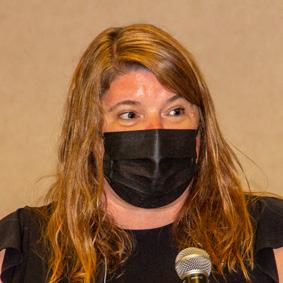
“I was surprised to realize that some of the traits that are dealing with difficult people I have. I realize now that difficult behavior not only comes from unkindness or meanness but other things that can drain you as a professional- stress, being tired and I maybe rely too much on my colleagues as friends to deal with issues.”
Kate Stroman SAD 54 EA
respectful manner. If the response is not kind, this is when you ask to take a break and come back to the conversation when things have settled.
Document, Document, Document
Keep records and timelines of everything to ensure you have a detailed narrative of any conversation that could end up being problematic for you in the future. If the conversation is in person, let that person know you will follow up with an email, and in that email you will document the details of the in-person conversation, creating a physical record.
Validate
Understanding and validating the other person’s feelings and emotions will let them know you understand their side of the story and shows them you are truly listening to them. Being an active listener and asking open-ended questions before responding will help defuse a difficult conversation. To make sure you’re understanding, it can also help to repeat what you hear the other person saying.
Keep the volume low
When you’re in a conversation with someone challenging, don’t match the tone or volume of the other person. Take a breath and your response will be appropriate. Ask the person you are dealing with to speak to you in a
Weingarten Rights
If you are ever in a conversation, and you believe there could be disciplinary consequences, remember your union Weingarten Rights which allow you to have union representation if you believe a conversation is going to lead to action which will impact your employment in any way. If you need support, your MEA rep is there for you. Use the QR Code below to contact your MEA rep.
SCAN HERE TO CONTACT YOUR UNISERV DIRECTOR
MAINEEA.ORG 7
SCAN ME
TEACHER PAY PENALTY
Inflation isn’t the only reason you all need to ask for salary increases at the bargaining table. The teacher pay penalty is at an all-time high, with Maine teachers paid 24% LESS than other comparable college-educated workers.
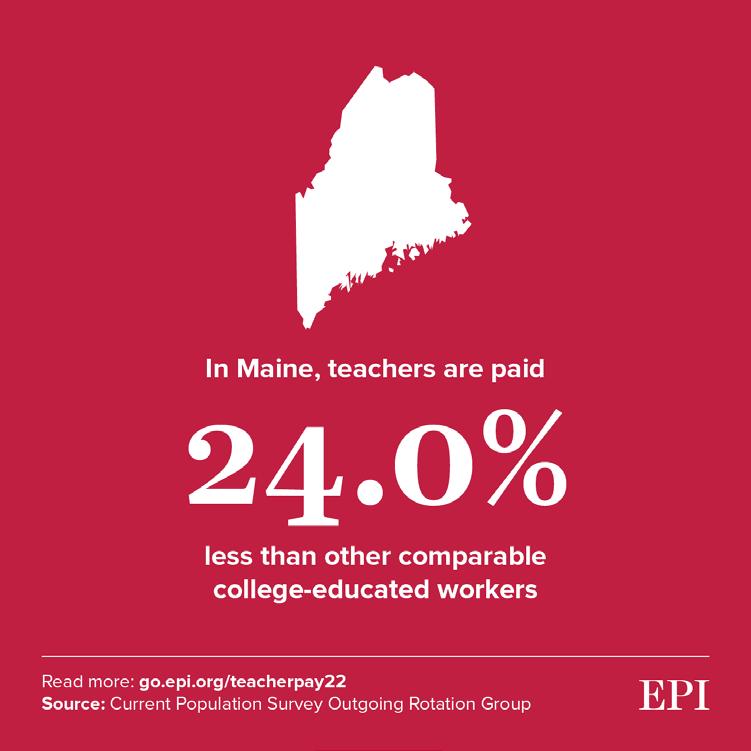
The data, from the Economic Policy Institute, shows a startling trend that will continue to make it difficult to attract and retain educators. MEA is working to help matters by pushing for legislative changes with a new $50,000 minimum teacher salary and inflation adjustments, but as the data indicates-and you all know-more immediate change is needed. (see more on $50K increase on page 26)
“Wages for teachers have been falling relative to comparable workers all over the country for many years,” says Lawrence Mishel, president of the Economic Policy Institute. “Teachers were paid two percent less [than comparable workers] in 1994, but by 2015 the wage penalty rose to 17 percent.”
Mishel says people often counter that teachers get summers off, but the EPI wage penalty data looks at weekly wages rather than annual wages for a more accurate picture of what teachers make to comparable professions requiring the same level of education, such as accountants.
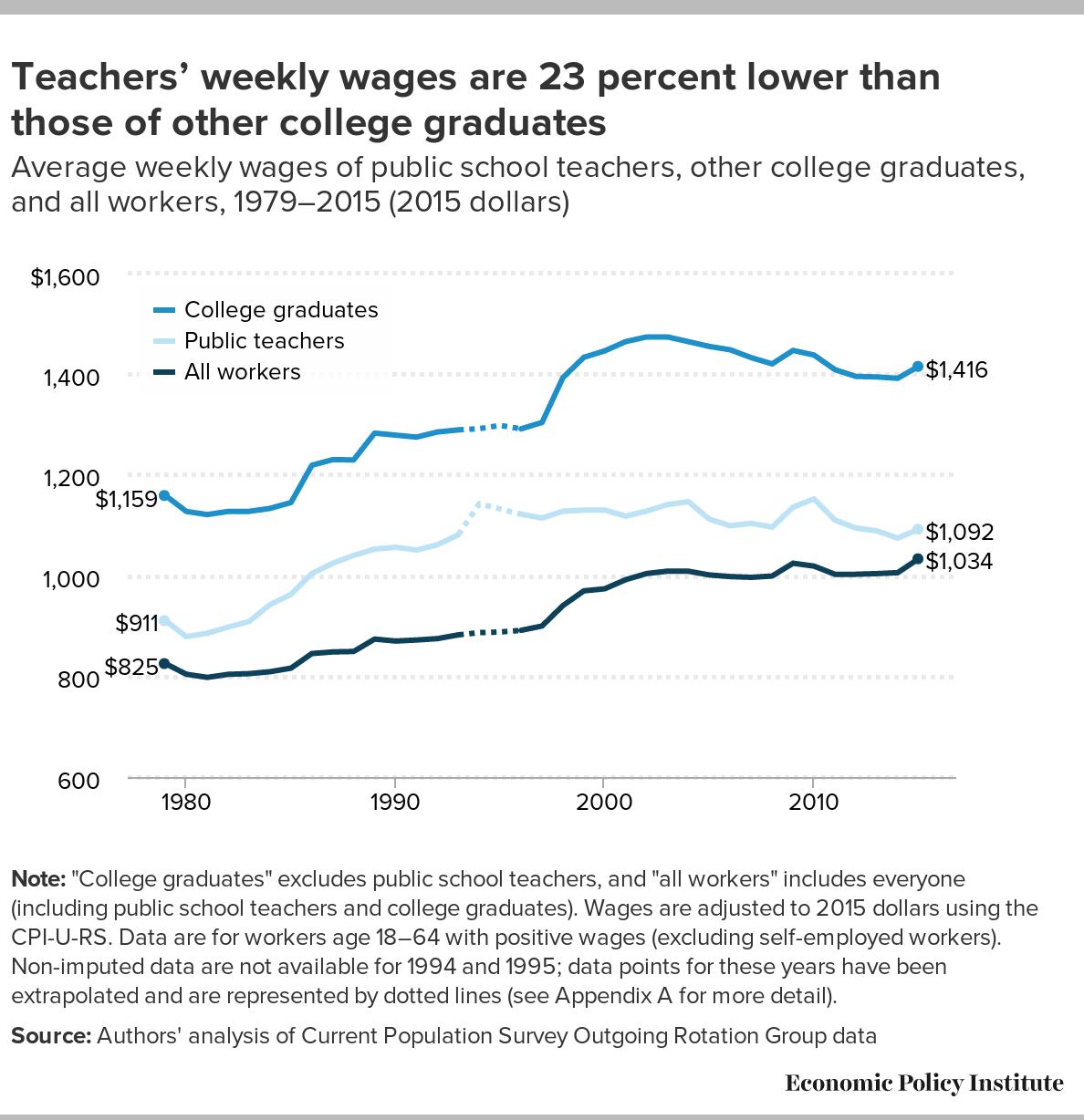
8 Maine Educator | Winter 2023
SCAN ME
SCAN HERE TO READ THE ENTIRE ECONOMIC POLICY INSTITUTE REPORT
Benefits Aren't Enough
“Teachers do get more in health and pension benefits than other comparable workers, but they are seeing an erosion there, too,” says Mishel. “But even when you take into account that teachers have better benefits, that doesn’t outweigh the problem they have with lower wages. Teachers get about 27 percent of their compensation in benefits -the rest are wages and they remain low.
The teacher pay penalty is a problem because it makes it hard for educators to maintain a middle class standard of living, he says. It matters for citizens and tax payers because good schools attract business and revenue for communities, but it matters to most to children because ultimately low salaries drive away good teachers.
“We are moving into a world where fewer people are trying to enter teaching, in part because the profession has been degraded by misguided accountability measures and also because of the erosion of pay,” says Mishel.
Key Findings
Inflation-adjusted average weekly wages of teachers have been relatively flat since 1996.

The average weekly wages of public school teachers (adjusted only for inflation) increased just $29 from 1996 to 2021, from $1,319 to $1,348 (in 2021 dollars). In contrast, inflation-adjusted weekly wages of other college graduates rose from $1,564 to $2,009 over the same period—a $445 increase.
$29 23.5%
The relative teacher wage penalty grew to a record high in 2021.
It was 23.5% in 2021, up from 6.1% in 1996. The penalty for men rose from 15.1% to 35.2% over that period. Women had a negligible wage penalty of 0.1% in 1996 but faced a wage penalty of 17.1% in 2021.
14.2%
The benefits advantage for teachers has not been enough to offset the growing wage penalty.
The teacher total compensation penalty was 14.2% in 2021 (a 23.5% wage penalty offset by a 9.3% benefits advantage). The bottom line is that the teacher total compensation penalty grew by 11.5 percentage points from 1993 to 2021.
Source: https://www.epi.org/ publication/teacher-pay-penalty-2022/
MAINEEA.ORG 9
SUPPORTING LGBTQ+ STUDENTS
by Understanding How They Feel
Survey highlights issues, offers solutions
Schools nationwide are difficult environments for many LGBTQ+ students, with a survey from the Gay, Lesbian, & Straight Education Network (GLSEN) showing the overwhelming majority regularly hear anti-LGBTQ+ language and experience victimization and discrimination at school. The impact of this environment makes it difficult for these students to receive the education they deserve. The 2021 GLSEN survey is a representative sample of students, ages 1321 from all 50 states and U.S. territories.
Maine Educator analyzed the survey and pulled some of the data to help members understand how students feel in school, and how to best support them. MEA encourages you to read through the survey to help start or continue the equity conversation at your school.
SCHOOL SAFETY
• 81.8% of LGBTQ+ students in the survey reported feeling unsafe in school because of at least one of their actual or perceived personal characteristics.
• LGBTQ+ students most avoided school bathrooms, locker rooms, and physical education or gym classes, with approximately 4 in 10 students avoiding each of these spaces because they felt unsafe or uncomfortable.
• 78.8% reported avoiding school functions or extracurricular activities because they felt unsafe or uncomfortable.

The vast majority of LGBTQ+ students who attended school in-person at some point during the 2021-2022 academic year experienced some sort of harassment at school.
• 76.1% experienced in-person verbal harassment
• 31.2% were physically harassed
• 53.7% of LGBTQ+ students were sexually harassed
BUT of those harassed or assaulted...
• 61.5% of LGBTQ+ students did not report the incident to school staff, because they did not think school staff would do anything about the harassment even if they did report it.
AND those who did report an incident....
• 60.3% of the students who did report an incident said that school staff did nothing in response or told the student to ignore it.
10 Maine Educator | Winter 2023
HARASSMENT AND ASSAULT AT SCHOOL Almost 60% of LGBTQ+ students had experienced LGBTQ+-related discriminatory policies or practices at school, including the following: 29.2% Can’t use chosen pronouns 27.2% Can’t use bathroom aligned with gender 23.8% Can't use locker room aligned with their gender DISCRIMINATORY SCHOOL POLICIES AND PRACTICES Understanding How Students Feel in School
EFFECTS OF A HOSTILE SCHOOL CLIMATE
A hostile school climate affects students’ academic success and mental health.
LGBTQ+ students who experience victimization and discrimination at school have worse educational outcomes and poorer psychological well-being.
LGBTQ+ students who experienced higher levels of in-person victimization because of their sexual orientation:
• Were nearly three times as likely to have missed school in the past month.
• Felt lower levels of belonging to their school community, performed poorer academically, and were nearly twice as likely to report that they did not plan to pursue any post-secondary education
• Had lower self-esteem and higher levels of depression
LGBTQ+-RELATED SCHOOL RESOURCES AND SUPPORTS THAT
MAKE A DIFFERENCE
Students who feel safe and supported at school have better educational outcomes. LGBTQ+ students who have LGBTQ+related school resources report better school experiences and academic success.
INCLUSIVE CURRICULAR RESOURCES
A majority (71.6%) of LGBTQ+ students reported that their classes did not include any LGBTQ+ topics in class. Research shows more inclusive curriculum make a difference in how LGBTQ+ students feel at school.
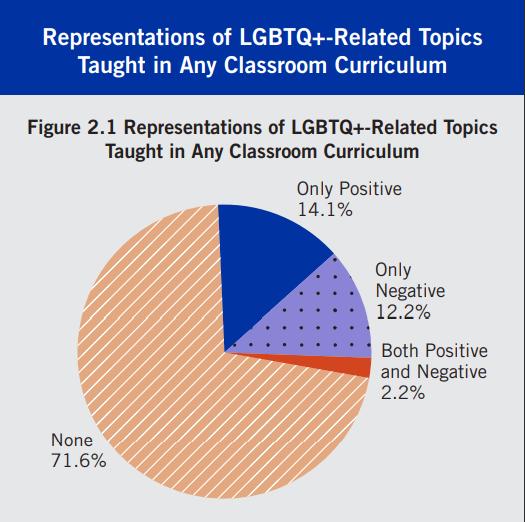
• Were less likely to hear homophobic remarks — “gay” used in a negative way (48.7% compared to 72.0% reporting often or frequently)
• Were less likely to hear negative remarks about transgender people often or frequently (23.6% vs. 42.7%)
• Were more likely to report that their classmates were somewhat or very accepting of LGBTQ+ people (66.9% vs. 35.3%
SUPPORTIVE SCHOOL POLICIES
Less than a quarter of LGBTQ+ students reported that their school administration was somewhat or very supportive of LGBTQ+ students. That’s why it’s important for schools to adopt policies that focus on the inclusiveness of all students. Among the suggestions, based on the results of the GLSEN survey:
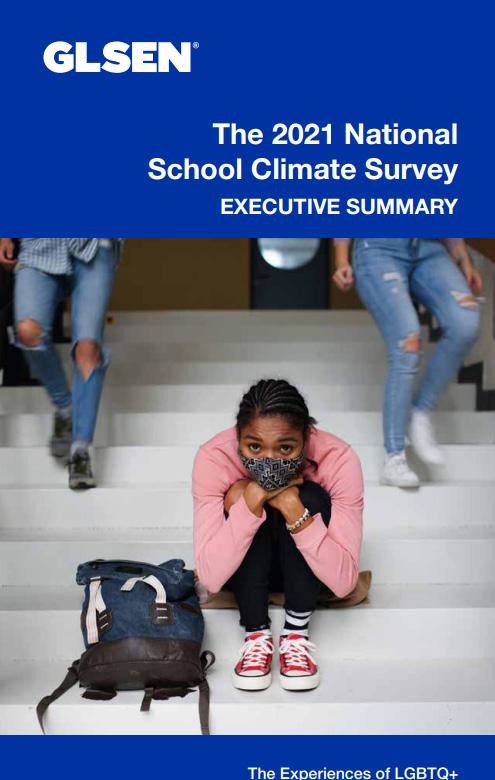
• Providing professional development for school staff to improve rates of intervention and increase the number of supportive teachers and other staff available to students
• Ensuring that school policies and practices, such as those related to dress codes and school dances, do not discriminate against LGBTQ+ students
• Enacting school policies that provide transgender and gender nonconforming students equal access to school activities and specify appropriate educational practices to support these students
• Adopting and implementing comprehensive bullying/harassment policies that specifically enumerate sexual orientation, gender identity, and gender expression in individual schools and districts, with clear and effective systems for reporting and addressing incidents that students experience
SUPPORTIVE EDUCATORS
GAY STRAIGHT/GENDER AND SEXUALITY ALLIANCES
Compared to LGBTQ+ students who did not have a GSA in their school, students who had an active GSA in their school:
• Were less likely to hear negative remarks often or frequently about gender expression (48.9% vs. 60.3%);
• Were less likely to have missed school in the past month because of feeling unsafe or uncomfortable (24.4% vs. 36.3%)
• Experienced lower levels of in-person victimization related to their sexual orientation (17.7% vs 33.0%)
Students who identified more supportive school staff reported feeling safer at school and were more likely to not miss classes and participate in school activities because they felt more included in the school community. Additionally, a comprehensive anti-bully policy also showed positive results in helping LGBTQ+ students feel safe and supported at school.
• Almost all LGBTQ+ students (96.3%) could identify at least one staff member supportive of LGBTQ+ students at their school.
• More than half of students (58.2%) could identify at least six supportive school staff
MAINEEA.ORG 11
SCAN HERE TO SEE THE FULL
SCAN ME
GLSEN SURVEY
Dyslexia 101: Questions & Answers for Educators
Dyslexia is a language-based learning disability leading to difficulties learning and processing language, including reading; it is the most common type of learning disability, impacting around 15% of students. Reading difficulties start with phonological awareness (e.g., a student hears a word and says the first sound). Other areas impacted include phonics and decoding with reading print to reading comprehension and vocabulary.
These difficulties lead to challenges in other areas like math and social studies (see Table 1 for resources; APA, 2022; IDA, 2020).
What dyslexia is not
Dyslexia cannot be cured; it is a lifelong disorder that impacts each student differently. Students with dyslexia typically have a normal IQ, and students can learn and meet their goals. With effective intervention and instruction,
Sara Flanagan, Ph.D., Assistant Professor of Special Education Rachel Brown-Chidsey, Ph.D., NCSP, Assistant Professor of Special Education, University of Southern Maine
students can develop reading and literacy skills to the best of their abilities (see Table 2 for more information; Gaab Lab, n.d.; IDA, 2020).
Dyslexia is not related to how eyes see letters or words, including backwards or upside down. Difficulties reading are due to how students’ brains process language. Students may skip lines and words when reading due to the different simultaneous skills needed to read a word (e.g., identifying letter-sounds, combining those to read a word). Students will not
12 Maine Educator | Winter 2023
catch up in reading or other academic areas on their own. Colored overlays and fonts are not effective; instead, systematic, explicit instruction is key (Flanagan & Gabrielli, 2022; Gaab Lab, n.d.; IDA, 2020). Not all students who struggle to read have dyslexia. For example, a common developmental milestone is transposing letters when learning to read. Students without dyslexia may experience difficulties learning to read; dyslexia has specific “red flags.”
What are "red flags" and how do you screen for dyslexia?
Although formal diagnosis of dyslexia requires a comprehensive evaluation, there are indicators that teachers may see. Screening tools indicate if a student has dyslexia risk factors as early as kindergarten (see Table 3 for possible indicators of dyslexia; IDA, 2022). If a kindergarten student has persistent difficulties learning letter names and sounds, it might signal a risk for dyslexia. For students in grades 1 and above, very slow reading, below grade reading, and poor spelling are additional indicators.
These indicators do not automatically mean that a student has dyslexia because there are other reasons why a student might struggle with reading (Middleton et al., 2022). For example, if a student has limited prior exposure to books or if a student has not attended school regularly, these might lead to reading delays (Barnes & Peltier, 2022). Teachers must support all students who struggle with reading, but to do so effectively, it helps to know why students struggle. The good news is that there are brief and effective screening tools that help teachers learn
References
whether a student shows possible signs of dyslexia and reading needs (Burns et al., 2022; Edwards et al., 2022).
Dyslexia screeners measure a student’s knowledge of sounds and symbols involved in reading (Daniel et al., 2022). Universal screening of all students in early grades (i.e., K-3) allows teachers to learn which students are on track for reading success and which might need additional intervention. Screeners can be a component of a multi-tiered system of support (MTSS) by providing data on a student’s reading (Middleton et al., 2022). Tiered interventions in MTSS can help teachers determine if a student’s reading problems are due to limited instruction
or potential dyslexia. Progress monitoring data collected is helpful for identifying if a student’s reading improvements are typical for the grade or much slower. When a student makes slow reading progress, despite evidence-based reading instruction, it can be another indicator of dyslexia.
How do students with dyslexia receive schoolbased services?
Students with potential dyslexia and who are not making progress with evidence-based intervention can be referred for special education. In 2015, the U.S. Department of Education Office of Special Education Programs (OSEP) clarified that students with dyslexia are eligible for special education under specific learning disability (USDOE, 2015). OSEP affirmed that schools can and should use the term “dyslexia” and engage in efforts to identify and support students.
Although students with dyslexia often require additional intervention, research indicates that they benefit from general reading instruction based on the science of reading (SOR). SOR refers to research documenting the most effective reading instruction includes direct, explicit, and systematic instruction (The Reading League, n.d.). All students benefit from the SOR, and it is strongly recommended as the basis for Tier 1, core general education reading instruction.
American Psychiatric Association (APA). (2022). What is a specific learning disorder? https://www.psychiatry.org/patients-families/specific-learning-disorder/what-is-specific-learningdisorder
Barnes, Z. T., & Peltier, T. K. (2022). Translating the science of reading screening into practice: Policies and their implications. Perspectives on Language and Literacy, 48(1), 38-44. Burns, M. K., VanDerHeyden, A. M., Duesenberg-Marshall, M. D., Romero, M. E., Stevens, M.A., Izumi, J. T., & McCollom, E. M. (2022). Decision accuracy of commonly used dyslexia screeners among students who are potentially at-risk for reading difficulties. Learning Disability Quarterly, 73194872210966. https://doi.org/10.1177/07319487221096684
Daniel, J., Vaughn, S., Roberts, G., & Grills, A. (2022). The importance of baseline word reading skills in examining student response to a multicomponent reading intervention. Journal of Learning Disabilities, 55(4), 259-271. https://doi.org/10.1177/00222194211010349
Edwards, A., van Dijk, W., White, C., & Schatschneider, C. (2022). Screening screeners: Calculating classification indices using correlations and cut-points. Annals of Dyslexia, 72(3), 445460. https://doi.org/10.1007/s11881-022-00261-5
Flanagan, S., & Gabrielli, D. (2022). Ineffective reading instructional practices and what to do instead for all students. Maine Educator. https://maineea.org/maineeducatoronline/ summer-22/ineffective-reading-instructional-practices-and-what-to-do-instead-for-all-students/ Gaab Lab. (n.d.). Resources: Dyslexia myths. https://www.gaablab.com/dyslexia-myths
International Dyslexia Association (IDA). (2020). Dyslexia basics. https://dyslexiaida.org/dyslexia-basics/ IDA. (n.d.). School-age dyslexia screener. https://dyslexiaida.org/screening-for-dyslexia/dyslexia-screener-for-school-age-children/ Middleton, A. E., Farris, E. A., Ring, J. J., & Odegard, T. N. (2022). Predicting and evaluating treatment response: Evidence toward protracted response patterns for severely impacted students with dyslexia. Journal of Learning Disabilities, 55(4), 272-291. https://doi.org/10.1177/00222194211047633 U.S. Department of Education (USDOE), Office of Special Education Programs (2015, October). OSEP DEAR COLLEAGUE LETTER on IDEA/IEP Terms. https://sites.ed.gov/idea/files/idea/ policy/speced/guid/idea/memosdcltrs/guidance-on-dyslexia-10-2015.pdf
MAINEEA.ORG 13
Dyslexia is not related to how eyes see letters or words, including backwards or upside down. Difficulties reading are due to how students’ brains process language.
SCAN
THE
SCAN ME
“ ”
HERE TO SEE
TABLE RESOURCES
Health
If employee works 20+ but less than FT, the rates are prorated
There is a 5% deducation in the percents if you are not enrolled in the Incentive Plan
those selecting the Standard 1000 Plan: In each year, afte the employee expends $200 toward his/her deductible the District will pay 15% of the remaining payments towards the deductible and will pay 25% of each 20% coinsurance payment
14 Maine Educator | Winter 2023
Insurance Contributions
Local Single Adult/Child 2 Adults Family Note ANDROSCOGGIN COUNTY Lisbon EA 90% CP/ST 85%CP/ST 85% CP/ST 75% CP/ST Auburn EA 90% CP/ST500/ST1000 85% CP/ST500/ST1000 80% CP/ST500/ST1000 80% CP/ST500/ST1000 Less than full time will be prorated RSU 73 EA 81% 81% 81% 81% Tri-Town EA 100% 77% 77% 77% AROOSTOOK COUNTY Ashland Area TA (RSU 32) 100% 100% Single ony 100% Single only 100% Single only Caswell TA 100% CP ST 100% CP Single 100% CP Single 100% CP Single Central Aroostook TA (RSU 42) 100% CP $1250 towards cost $1250 towards cost $1250 towards cost Eastern Aroostook EA (RSU 39) 100% with incentive/95% without incentive 100% with incentive/95% without incentive 75% with incentive/70% without incentive 75% with incentive/70% without incentive CP provided/ST available with employee paying the difference Easton TA
to 2003 89.15% ST; 90.65% CP/After 2003 84.15% ST; 87.65% CP
to 2003 89.45% ST; 90.65% CP/After 2003 84.15% ST; 87.65% CP Prior to 2003 89.45% ST; 90.65% CP/After 2003 84.15% ST; 87.65% CP
to 2003 89.45%
Fairfield TA(RSU 86) 100% CP 100% CP 68%
Community School Teacher’s Association 100% with incentive/95% without incentive 100%
75%
Professional EA 100% 100% S towards cost 55%
RSU 50 EA 100% Hired before 08/01/2003 $796 per month
The MEA is always trying to provide its members with the most up-to-date information about your benefits in an effort to help you better understand what you're receiving and how it compares to other districts in your county. How much a district contributes to your health insurance plan is a negotiable item, making the data below vital to making the most of your membership. On the following four pages you will find the 2021-2022 school district health insurance yearly contributions for teachers.
Prior
Prior
Prior
ST; 90.65% CP/After 2003 84.15% ST; 87.65% CP Fort
CP 68% CP Less 5% w/o participation in the Incentive Program Limestone
with incentive/95% without incentive
with incentive/70% without incentive 75% with incentive/70% without incentive CP provided/ST available with employee paying the difference Madawaska
55%
Hired before 08/01/2003 $1014 per mounth Hired before 08/01/2003 $1234 per mouth
RSU 86, Fort Fairfield Area (Formerly SAD 20) 100% 100% 68%
68%
RSU 89, Patten Area (Formerly
25) 100% CP/ST 500/ST 1000 Single only Single only Single only
SAD 01 EA (RSU 79) $1,887 $1,877 $1,877 $1,877 Employees may select ST but the rate the board will pay is CP SAD 70 EA (RSU 70) $963 $963 $963 $963 Union 122 TAWoodland $1,300 per month FT/PT prorated Van Buren EA (RSU 88) 100% CP/77% ST 88% CP/77% ST 84% CP/72% ST 83% CP/72% ST Washburn TA (RSU 45) $1,250 $1,250 $1,250 $1,250 CUMBERLAND COUNTY Gorham TA 95% ST/CP 95% ST/CP 95% ST/CP 95% ST/CP Scarborough EA 80% 80% 80% 80% Westbrook EA 87% CP/84% ST 87% CP/84% ST 84% CP/81% ST 84% CP/81% ST Gray-New Gloucester TA (RSU 15) 88% 88% 77% 77% Lake Region TA 90% CP 77.5% CP 77.5% CP 77.5% CP Employees who wish to use ST must pay the difference; any increase above 6% in rates will be covered by the employee. Sebago East Shore EA (RSU 14) 100% 50% 50% 50% Cape Elizabeth EA 86% 86% 86% 86% Falmouth EA 100% 95% 82% 82% SAD 51 EA (RSU 51) 97% 96% Pre 1993 - $21450/Post 1993- $18857 $21,517 South Portland TA 82% CP 82% CP 82% CP 82% CP Vocational Region Ten TA 87% CP Single only Single only Single only Yarmouth EA Up to 108% of previous years with any additional split 50/50 Up to 108% of previous years with any additional split 50/50 Up to 108% of previous years with any additional split 50/50 Up to 108% of previous years with any additional split 50/50 For
Portland EA 100% of prior year plus 3% of increase 100% of prior year plus 3% of increase 100% of prior year plus 3% of increase 100% of prior year plus 3% of increase Abbreviations: S = Standard Plan only | ST= Standard 500 or Standard 1000 | CP=Choice Plus
SAD
under full time rate is prorated
MAINEEA.ORG 15 FRANKLIN COUNTY Mount Abram TA (RSU 58) 86% CP/ST% Single rate Single rate 76% CP/ST Mt Blue Regional School District (RSU 09) 79.50% 79.50% 79.50% 79.50% Teachers who choose Standard 500/Standard 1000 must pay the difference in premium cost Rangeley TA 85% 90% 80% 80% Stratton EA 90% 80% 80% 80% HANCOCK COUNTY Island TA 100% 90% 80% 75.00% Penobscot Bay EA (RSU 20) $775 $1,230 $1,450 $1,780 Penobscot Bay TABlue Hill 80% 80% 80% 80%
is
will
50%
Penobscot Bay TABlue Hill 80% 80% 80% 80%
is
will
50%
Penobscot Bay TABrooksville 95% 80% 80% 80% Penobscot Bay TACastine 100% CP 90% CP 90% CP 80% CP Penobscot Bay TAPenobscot 100% 80% 80% 80% Penobscot Bay TA - Surry 90% CP 90% CP 90% CP 80% CP Sedgwick EA 100% CP 80% CP based on the chosen plan, pro rated based on employment 80% CP based on the chosen plan, pro rated based on employment 80% CP based on the chosen plan, pro rated based on employment Down East EAHancock 100% 50% 50% 50% Down East EALamoine 100% 50% 50% 50% Down East EARSU 24 Sullivan 100% CP Single only Single only Single only Ellsworth TA 80% 80% 80% 80% Union River Valley TA - Otis 100% CP 100% Single plus 60% cost of Adult/Child no coverage no coverage Mount Desert Island EA (New Unit) 82% 82% 82% 82% KENNEBEC COUNTY Kennebec Intra District Schools EA 92.5% CP/Standard 500/ Standard 1000 75% CP/Standard 500/ Standard 1000 75% CP/Standard 500/ Standard 1000 75% CP/Standard 500/ Standard 1000 Kennebec Intra District Schools EA 92.5% CP/Standard 500/ Standard 1000 75% CP/Standard 500/ Standard 1000 75% CP/Standard 500/ Standard 1000 75% CP/Standard 500/ Standard 1000 Augusta EA 100% CP/Standard 500/ Standard 1000 70% CP/Standard 500/ Standard 1000 70% CP/Standard 500/ Standard 1000 70% CP/Standard 500/ Standard 1000 Fayette EA Hired before2006 100%; Hired after 2006 95% CP Hired before 2006 80%; Hired after 2006 80% CP Hired before 2006 80%; Hired after 2006 80%CP Hired before 2006 80%; Hired after 2006 70% CP Gardiner TA 100% 70% 70% 70% Maranacook Area Staff Association 100% CP 77% CP 77% CP 77% CP Region School Unit 4 EA 100% CP 80% CP 80% CP 80% CP Employees currently receiving 100% single Stand will be grandfathered to 100% Standard 500 RSU 18 EA 100% 95% 95% 95% Vassalboro EA (AOS 92) 100% ST/100% CP 85% of preminum for CP 85% of Adult/Child 85% Adult-Child only Waterville EA 100% ST 80% ST for Adult w/child 80% ST for Adult w/child 80% ST for Adult w/child Winslow EA ST/CP 100% ST 62.5%/CP 77.5% ST 62.5%/CP 77.5% ST 62.5%/CP 77.5% Winthrop Educators Association $370 paid by Employee/ remainder paid by Employer 80% CP 80% Cp 80% CP Sheepscot Valley EA (RSU 12) 95% CP 85% CP 76% CP 76% CP KNOX COUNTY Seacoast EA 100% CP/100% + $300 ST500/100%+$600 ST1000 87% CP/87%+500 ST500/87%+$950 ST1000 80%CP/80%+$600 ST500/80%+$1100 ST1000 80%CP/80%+$700 ST500/80%+$1300 ST1000 Hope TA 95% 80% 80% 80% Lincolnville 100% CP 95%CP 80%CP 80%CP Megunticook TAFive Town CSD 100% CP; 100% ST500 plus $500; 100% ST1000 plus $500 85% CP; 87% ST500; 89% ST1000 84% CP; 87% ST500; 89% ST1000 84% CP; 87% ST500; 89% ST1000 Megunticook TARSU 28 100% CP; 100% ST500 plus $500; 100% ST1000 plus $500 85% CP; 87% ST500; 89% ST1000 84% CP; 87% ST500; 89% ST1000 North Haven TA 95% 86% 86% 86% Region Eight Employees Association 100% 87% 82% 84% LINCOLN COUNTY Boothbay Region EA 100% 80% 80% 80% Bristol EA (AOS 93) 90% 80% 80% 80%
ST
available with employee paying the difference. Teachers
pay
of any annual rate increase above 10%
ST
available with employee paying the difference. Teachers
pay
of any annual rate increase above 10%
16 Maine Educator | Winter 2023 Damariscotta Area TA - Great Salt Bay 97% 87% 82% 82% Edgecomb EA 100% CP 80% CP 80% CP 80% CP Medomak Valley EA (RSU 40) 100% 80%/Standard employee pays difference/ST500 83%/ST100085% 80%/Standard employee pays difference/ST500 83%/ST100085% 80%/Standard employee pays difference/ST500 83%/ST100085% Nobleboro TA 90% 80% 80% 80% South Bristol TA 90% 80% 80% 80% Southport EA 100% 80% 890% 80% St. George EA 100% 100% S plus 75% of difference 100% S plus 75% of difference 100% S plus 75% of difference Wiscasset TA 95% CP 85% Cp 85% CP 85% CP Jefferson TA (AOS 93 - Jefferson) 87% 82% 82% 82% OXFORD COUNTY Oxford Hills EA (RSU 17) 80% 80% 80% 80% Pequawket Valley EA (RSU 72) 100% 95% 88% 88% Employees can choose ST/CP/ST500 Dirigo EA 90% CP 80% CP 80% CP 80% CP Telestar Educators Association of SAD 44 100% Cp 100% CP none none Western Foothills EA 90% CP 80% CP 80% CP 80% CP PENOBSCOT COUNTY SAD 63 TA 95% CP 90% CP 75% Cp 70% Cp RSU 19 TA 100% 85% 75% 66% Penobscot Bay EA $775 $1,230 $1,450 $1,780 Penobscot Bay TA 90% CP 90% CP 90% CP 80% RSU 25 TA 88% CP 80% CP 80% CP 80% CP East Millinocket TA 100% 77% 77% 77% East Range II TA 100% CP/93%ST Single only Single only Single only Glenburn EA 95% 75% 75% 75% Greenbush EA 90% CP/85% ST 74% 74% 74% Milford EA 80% CP/ST 75% CP/ST 75% CP/ST 75% CP/ST Millinocket EA 80% prior to 09/01/2009; 80% Only after 09/01/2009 80% prior to 09/01/2009 only 80% prior to 09/01/2009 only 80% prior to 09/01/2009 only Orono EA ST500 87.5%/CP 85% ST500 85%/CP 83.5% ST500 85%/CP 843.5% ST500 85%/CP 843.5% Penobscot Valley EA 83% CP 83% CP 83% CP 83% CP Region 3 EANorthern Pen. ST 80%/CP 85% ST 80%/CP 85% ST 80%/CP 85% ST 80%/CP 85% Region 4 EA 100% ST 60% ST 60% ST 60% ST RSU 67 EA 80% CP 80% CP 80% CP 80% CP SAD 30 Pioneer TA (RSU 30) 100% 50% CP new hires/62% others 50% CP new hires/62% others 50% CP new hires/62% others Veazie EA 90% CP/95% ST500 88% CP if hired prior to 9/2014;80% CP if hired after 9/2014; 85% ST500 88% CP if hired prior to 9/2014;80% CP if hired after 9/2014; 85% ST500 88% CP if hired prior to 9/2014;80% CP if hired after 9/2014; 85% ST500 Hermon EA 91%% 80% 77% 77% Orrington TA 100% 90% 85% 80% SAD 23 TA (RSU 87) 80% 80% 80% 80% SAD 64 TA (RSU 64) Prior to 7/1/03 100%; After 9/1/09 95% 87% 87% 87% Tri-22 EA 100% 70% 70% 70% East Machias EA 100% FT/pro rated PT Single only Single only Single only RSU 37 TA S Standard only PISCATAQUIS COUNTY SAD 41 EA (RSU 41) 100% 75% of difference between single and Adult/Child 75% between single and 2-person 75% between single and family Foxcroft Academy EA $2171 annual $3830 annual $4216 annual $5415 annual Greenville EA 100% 75% 75% 75% SAD 04 EA (RSU 80) 80% CP/ST 77% 77% 77% SAGADAHOC COUNTY Brunswick EA 85% 85% 85% 85% Coastal EA (RSU 5) 100% 94% 94% 86% Part-time educators will
the
paid
the % they
coverage) Sagadahoc EA (RSU 01) 100% CP 91% of prior years dep. Plan 91% of prior years dep. Plan 91% of prior years dep. Plan If the employee slects the Standard plan, they will have to pay the difference between CP Single and the plan choosen. West Bath EA 100% CP 91% Prior Year’s Rate CP 91% Prior Year’s Rate CP 91% Prior Year’s Rate CP Georgetown TA 100% Cp 94% if hired prior to 8/12; 82% if hired after 8/12 94% if hired prior to 8/12; 82% if hired after 8/12 94% if hired prior to 8/12; 82% if hired after 8/12 Merrymeeting TA 94% 94% 94% 94% SOMERSET COUNTY Athens EA 100% CP/ST500/ST1000 80% 80% 80% Employees pay the difference for dependent coverage Carrabec EA $8,960 $14,454 $17,908 $21,650 Harmony TA 77% 77% 77% 77% Jackman TA (RSU 82) 95% 75% 75% 75% Employees may select another MEA Trust plan but must pay the difference Madison Area TA 100% 86% 84.20% 83%
be
regular benefit
adjusted for
are paid. (i.e. 75% work hours = 75% paid
Hired before 7/7/07 78% of additional cost of Single ST or 80% of CP; 7/1/07 new hires Single ST. Hired before 7/17 80% ST/CP; Hired after 7/17 after 2 years of employment 80% ST/CP
Hired before 7/7/07 78% of additional cost of Single ST or 80% of CP; 7/1/07 new hires Single ST. Hired before 7/17 80% ST/CP; Hired after 7/17 after 2 years of employment 80% ST/CP
Hired prior to 2012 - 83%/ Hired after 2012 - 75%/ Hired after 2014 - 70%
Hired before 7/7/07 78% of additional cost of Single ST or 80% of CP; 7/1/07 new hires Single ST. Hired before 7/17 80% ST/CP; Hired after 7/17 after 2 years of employment 80%
Pro-rated for less then full-time
Any increase above 4% will be shared by the employees and the board. Employees can select ST500,1000 but they are responsible for the difference between CP and ST500, 1000 cost.
MAINEEA.ORG 17 SAD 49 TA (RSU 49) 100% ST/CP 65% ST/70% CP 65% ST & 70% CP 60% ST & 70% CP SAD 53 EA 85% 85% 85% 85% SAD 54 EA (RSU 54) 100% CP (07/after); 98% ST (06/earlier) 94%CP (07/after); 93% ST (06/earlier) 86%CP (07/after); 85% ST (06/earlier) 75% CP (07/after); 72% ST (06/earlier) Upper Kennebec Valley EA 100% 80% 80% 80% WALDO COUNTY SAD 03 EA 85% 83% 79% 79% Islesboro TA 90% 85% 80% 80% Northport School Department EA 95% 82% 82% 82% RSU 71 EA 82% 77% 72% 72% Waldo County Technical Center TA 90% CP 32+ hours 85% CP 32+ hours 85% CP 32+ hours 85% CP 32+ hours WASHINGTON COUNTY Alexander EA 100% Single only Single only 60% Calais EA 100% 82% 82% 82% Charlotte EA 100% CP 80% after 1 year of employment 80% after 1 year of employment 80% after 1 year of employment Cherryfield TA 100% Single only Single only Single only Downeast TAPrinceton 100% CP Single only Single only Single only Eastport EA 100% 65% 65% 65% Jonesboro TA 100% Single only Single only Single only Lubec EA (RSU 85) 100%
2012
Hired prior to
- 83%/ Hired after 2012 - 75%/ Hired after 2014 - 70% Hired prior to 2012 - 83%/ Hired after 2012 - 75%/ Hired after 2014 - 70%
Moose-a-bec TA 100% Single only 100% Single only 100% Single
100% Single
Pembroke EA 100% CP 75% 75%
only
only
75%
ST/CP
Perry EA 100%
School Union 134 TA - Culter 100% Single only Single only Single only PT prorated School Union 134 TA - Machiasport 100% Single only Single only Single only Washington Academy TA 100% FT prior to 1997-98 contract/100% after 1997-98 FT 100% prior to 1997-98 contract Ft 100% prior to 1997-98 contract FT 100% prior to 1997-98 contract PT teachers % of S based on their teaching load Woodland EABaileyville 100% CP 78% CP 78% CP 78% CP YORK COUNTY Acton EA 90% 83% 83% 83%
will
CP Kennebunk, Arundel/ Kennebunkport EA 82% 82% 82% 82% Kittery EA 86% 86% 86% 86% Employee
Quamphegan EA 91% 84% 84% 83% SAD 60 TA 92% ST/CP 87% ST/CP 80% ST/CP 80% CP Sanford Federation of Teachers HMO 2 - 84%/HMO 3 - 94%/ HMO 4 - 95%/POS 79% HMO 2 - 84%/HMO 3 - 94%/ HMO 4 - 95%/POS 79% HMO 2 - 83%/HMO 3 - 93%/ HMO 4 - 94%/POS - 78% HMO 2 - 83%/HMO 3 - 93%/ HMO 4 - 94%/POS - 78% Wells - Ogunquit 85%CP 85%CP 85%CP 85%CP Any increase
York TA 85% 85% 85% 85%
Biddeford TA 92% 90% 78% 78% Dayton EA 93% 90% 80% 80%
RSU 23 EA 93% CP 89% CP 87% CP 87% CP
Saco EA 84% 80% 80% 80% Saco Valley TA (RSU 6) 80% 80% 80% 80% Thornton Academy TA 100% CP/85% Standard Single only Single only Single only Massabesic EA 90% CP 85% CP 80% CP 80% CP
SCAN HERE TO ACCESS THE HEALTH CARE DATABASE SCAN ME
ST/CP
Note: pre or post 9/1/11 employees can select 500/1000 %
apply from
shall pay the difference for the MEA Standard Plan.
over 8% shall be shared by both parties
Part time prorated
Employees may select the Standard plan but will be required to pay the difference.
The RA is the decision-making body of the Association. You can help set the course of the MEA by submitting a resolution or new business item.
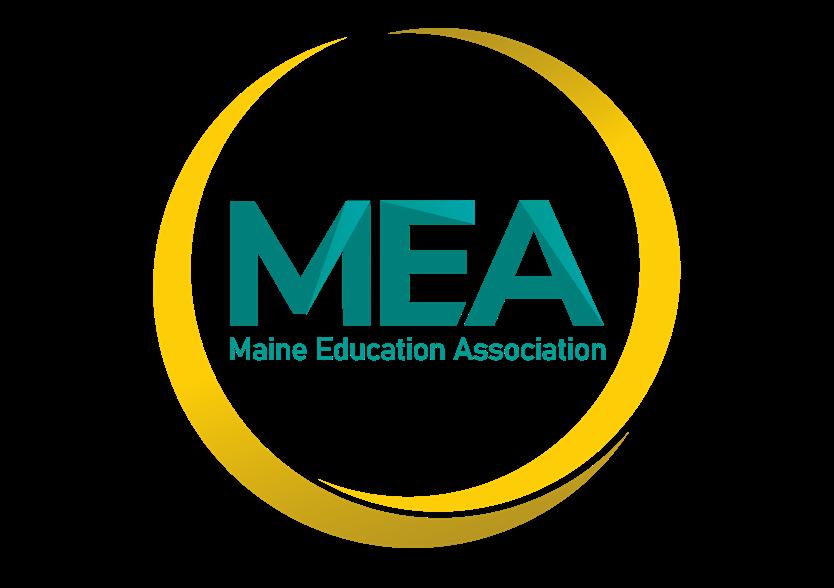
WRITE A RESOLUTION
Example of a Resolution (belief statement):
Resolution C30. RESOLVED: That the MEA believes all students must attend safe schools to optimize learning.
WRITE A NEW BUSINESS ITEM
Example of NBI: (1-year action item) NBI - That the MEA gather current information to an MEA position that clearly defines what appropriate space, proper heating/ cooling/venitilation systems, sufficient maintenance and air/ water quality standards are in schools.
18 Maine Educator | Winter 2023
AND BE PART OF THE MEA REPRESENTATIVE ASSEMBLY!
GET INVOLVED
RESOLUTIONS AND NEW BUSINESS ITEMS WILL BE DISCUSSED AT THE MEA
TO LEARN MORE ABOUT THE
AND HOW TO BECOME
DELEGATE? VISIT: MAINEEA.ORG/RA SUBMIT FORMS TO: MEA Resolutions Committee 35 Community Drive Augusta,
Submission Deadline: March 4, 2023 Make Your VOICE HEARD 4
RA IN MAY. WANT
MEA RA
A
ME 04330 Contact your local president or call Alex Bellami at 207-888-3948 or email: abellami@maineea.org
Certification Rule Changes

Several changes have been made to the certification rules in Maine as the state works to maintain well-qualified educators for our students. The MEA went through the changes and compiled this simple outline to help you understand what you need to know in order to remain certified. If you have questions, please reach out to MEA’s Director of Instruction, Professional Development and Early Educator Engagement.
*IMPORTANT NOTE:
MEA worked hard to advocate to allow teachers who are currently certified to renew under the old rules, as long as you don’t let your certification expire. If you renew before expiration, none of the new requirements apply. If you do not renew your certification before it lapses, you will be held to the new rules outlined below.
Summary of Changes
Impacting ALL New Educators and Those Applying for a New Certification
Contact Hours Needed
Ed Techs
45 hours or 3 semester hours Teachers/Specialists/ Administrators 90 semester hours
OR
Praxis exams are no longer required.
Alternative options include:
• Passing a basic skills test in reading, writing, mathematics;
• Achieving at least a 3.0 cumulative GPA in all courses required for the certification;
OR
• Achieving a successful portfolio review demonstrating competency in Maine’s Initial Teacher Standards (Evaluated by the Department of Education)
*New Coursework Required for Certification
• Three semester hours of diversity-centered content related to today’s classroom
• Three semester hours of human/child development or educational/developmental psychology
*Note: those who were certified before June 10, 2022 do not need to complete these courses to maintain their current certification.
Other Changes of Note for NEW certifications (does not not apply to those
certified before June 10, 2022)
Elementary Teacher (020)
• Grade spans moved to K-6
• Additional literacy course, examples include teaching reading, teaching writing, children's literature, writing process, foundations of literature, multicultural literature
Inclusion of Pre-K in many endorsements
• If your current certificate does not include PK but you are interested in teaching PK, you will need to meet the new course requirements.
While these are some of the changes, there are many others that may impact other certifications. For more information, please reach out to the MEA for a copy of our webinar with the DOE, or scan here to visit the DOE’s Certification page.
SCAN ME
Questions about your certification? Reach out to the DOE at cert.doe@maine.gov Or (207)624-6603
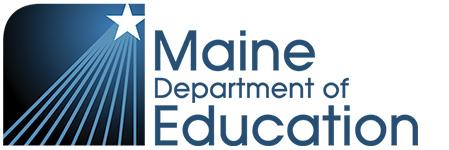
MAINEEA.ORG 19
Up in Smoke Up in Smoke Up in Smoke

The On-Going Vaping Issue in Maine Schools and How Educators Can Help
31.7%
of high school students have used an electronic vape product. 17.4% reported using a vape device at least once in the last 30 days.
57.6% last time they used an electronic vapor product inhaled nicotine.
25.4% last time they used an electronic vapor product inhaled marijuana, THC or hash oil.

The latest data, from the 2021 Maine Integrated Youth Health Survey, shows vaping continues to be an issue in Maine schools despite a decline in usage since 2019. More students use vape products now than smoke traditional cigarettes.
Schools across the state have worked hard to curb electronic cigarette usage, doing things like installing vape detectors in bathrooms, but addiction experts say more work is needed to help educators understand the continually changing vape products, how addiction manifests itself in classroom behavior, and what help is most useful for students.
The Changing Vape Products
When vaping first became popular, the most prevalent devices teens used to inhale looked like USB drives, small and inconspicuous, especially in schools. However, addiction experts now say the industry has changed, and continues to change with puff bars becoming the more common device in the vaping world.
“
The evolution of the products themselves has changed. For so long it was Juul, and that looks like a USB stick. A lot of the new products don't look like that...Adults often don't know what they're looking at.
- Rowan McFadden, Healthy Androscoggin
20 Maine Educator | Winter 2023
”
“The evolution of the products themselves has changed-for so long it was Juul, and that looks like a USB stick. A lot of the new products don’t look like that—they look like highlighters now. There is so much diversity in what they look like; adults often don’t know what they’re looking at,” said Rowan McFadden with Healthy Androscoggin, an organization that focuses on substance and tobacco use prevention.
McFadden says understanding the differences in the design of the products is the first step in helping educators recognize if a student is using while on school grounds.
“Many of these products don’t have a lot of vapor so it’s easy to use randomly. In the beginning, the big cloud was associated with vaping and now a lot of products kids are using don’t have a lot of aerosol cloud coming out so you can blow a puff into your locker and move on and people wouldn't know,” said Joanne Joy with Healthy Communities of the Capital Area.
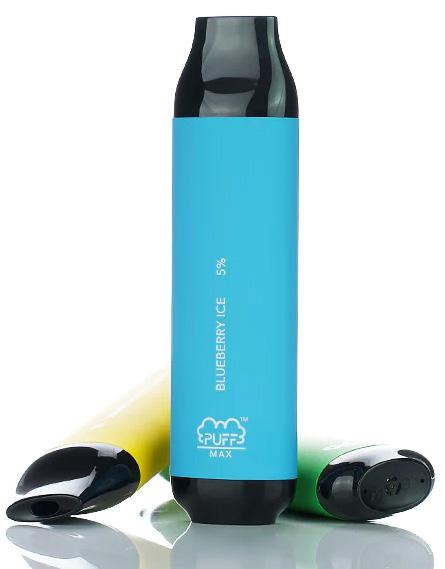
Pictured on this page are the more common vape products that are currently on the market. While these are some, addiction experts say they are by no means all. Vaping can be done through a vape watch that looks like the common digital watches available for sale, or through a hooded sweatshirt, vaping out of the strings attached to the hood.

Vape Impacts on School Behavior
The medium-sized puff bar contains about 400 puffs and can contain as much nicotine as 2-3 packs of cigarettes. According to behavioral health experts, teens tend to inhale more deeply and in turn are getting higher levels of nicotine in their lungs.
This amount of nicotine, particularly the withdrawal when a student can’t vape, can cause problems in school including depression, high anxiety, and increased stress.
“For teachers, it’s about identifying those moods. Asking teachers in general to be the vape police is really extreme. It’s more of an awareness for them. If you sense that a class group or a couple of kids in your class seem to have a heightening behavior problem in the middle of class that could be the point where intervention is necessary. In some schools they’ve had challenges with their sports teams not having the stamina to practice because they’re vaping and using marijuana,” added Joy.

MAINEEA.ORG 21
For teachers, it's about identifying those moods. Asking teachers in general to be the vape police is really extreme. It's more of an awareness for them.
“ ”
-Joanne Joy, Healthy Communities of the Capital Area
STORY CONTINUES ON PAGE 22
What's in an E-Cigarette?

Source: Centers for Disease Control and Prevention
How To Support Students
Research shows suspension for vape usage generally increases the frequency of vaping, but programs that are alternatives with an education component can help.
The state created eight Maine Prevention Networks, in part to help those in need of addiction support. They will be fully operational on January 1, 2023, with employees who can help schools create anti-vaping policies and conduct presentations to help students understand the true impact of vaping.
McFadden says ensuring schools have access to and refer students to programs like “My Life My Quit” is crucial in stopping kids from vaping and potentially using more serious drugs later in life. The program, among other things, helps teens deal with stress in better ways; stress is one of the top reasons youths admit to starting to vape, and one of the top marketing strategies of the vape companies to get kids hooked on their products—claiming vaping is a stress reliever.
The “My Life My Quit” program offers the following advice to help shape a conversation with a teen who asks about tobacco or seems interested in quitting using tobacco:
• Nicotine addiction can happen very quickly.
• All tobacco products, including vaping devices like e-cigarettes, contain nicotine and are addictive. Many teens believe vaping is not tobacco. Let them know vaping is tobacco and it has the same addictive properties whether they are smoking cigarettes, e-cigarettes, or vaping.
• The longer a teen uses nicotine, the more addicted they are likely to become, and the harder it will be to stop.
• Medications used for quitting tobacco (nicotine replacement therapies – NRT) have been approved as effective treatment to help adults quit tobacco. If a teen asks about quit medications, refer them to a healthcare professional who can help decide whether these medications might work in their individual situation.

For more resources to help, including the complete list of Maine Prevention Networks, log on to our website maineea.org.
SCAN HERE FOR MORE RESOURCES TO HELP
SCAN ME
To speak to someone in your area about hosting a training in your area or to receive more resources, contact the prevention experts in your area.
District 1- York--York County Southern Maine Health Care Alexa Christie—alexa.christie@mainehealth.org
District 2-Cumberland--Cumberland County Portland Public Health Val Johnstone—vjohnstone@portlandmaine.gov Samantha Liang—sliang@portlandmaine.gov
District 3-Western--Androscoggin, Franklin and Oxford Counties
Androscoggin--Healthy Androscoggin Rowan McFadden—rowan.mcfadden@cmhc.org Emily Dooling Hamilton—doolinem@cmhc.org
Franklin--Healthy Communities Coalition Sarah Mulcahey—sarah.mulchahey@mainehealth.org Lillian Hunt—lillian.hunt@mainehealth.org
Oxford--Healthy Oxford Hills Courtney Lavornga—courtney.benett@mainehealth.org
District 4-Midcoast--Waldo, Sagadahoc, Knox, Lincoln Counties Waldo-- Jemma Penberthy jemma.penberthy@mainehealth.org
Sagadahoc--Southern Midcoast Communities for Prevention Andrea Saniuk-Gove-andrea.sainu-gove@mainehealth.org
Knox--Knox County Community Health Coalition Becky Boober, Ph.D.--beckyhbooberkcchc@gmail.com
Lincoln--Healthy Lincoln County Will Matteson--wmatteson@healthylincolncounty.org
District 5-Central--Somerset and Kennebec Counties Kennebec--Healthy Communities of the Capital Area Renee Page - r.page@hccame.org April Hughes--a.hughes@hccame.org
Somerset--Somerset Public Health Sean Landry—slandry@rfgh.net
District 6-Penquis--Penobscot and Piscataquis Counties Bangor Public Health Roxane Dubay—roxane.dubay@bangormaine.gov
District 7-Downeast--Washington and Hancock Counties Healthy Acadia Mia Petrini—mia@healthyacadia.org Katie Sell—katie.sell@healthyacadia.org
District 8-Aroostook--Aroostook County Aroostook County Action Program info@acap.org
Tribal Health District—5 Tribal Communities Wabanaki Public Health and Wellness hello@wabanakiphw.org

22 Maine Educator | Winter 2023
MEAArt Contest
Maine Educator will feature a cover designed by a Maine public school art student depicting the theme “What I Love About Maine.”


• Who: Grades K-4, 5-8, 9-12 –


• Deadline: April 29th
FMI: maineea.org/awards
Clyde Russell Scholarship
The


My Hero Works at School Essay Contest
The MEA is pleased to join with the Portland Sea Dogs for its annual “My Hero Works at

(1) Who will attend a 4-year college (2) Who will attend a Maine Community College
FMI: clyderussellscholarshipfund.org
DEADLINE IS FEBRUARY 1, 2023
MEA Awards
MEA offers awards to members to honor colleagues. To apply for an MEA award, visit: maineea.org/awards-grants
Read Across America Grants
To help plan and prepare for a reading celebration, MEA is offering Read Across America Incentive Grants to our local associations who sponsor association activities for this event. Grants of $50 each will be awarded.
FMI: maineea.org/awards-grants
DEADLINE: February 1, 2023
Partnership for Caring
Under the Partnership for Caring, MEA will assist local affiliates to meet exigent expenses of an unpredictable nature incurred by members or their immediate families. Contact MEA President for more information.
scholarship Trustees have designated two different categories of awards for Graduating High
MEA
ScanHeretoApply to MEA Awards and Contests SCAN ME Scan Here to thevisitClyde Russell Scholarship SCANME
Bulletin Board
Meet Matt Meet Matt Meet Matt
The self-described ‘regular guy’ now has a remarkable title-2023 Maine Teacher of the Year-and he plans to use that title as he works to promote the profession and increase the number of people entering teaching. Bernstein believes if more people saw what teaching was really like, and the impact educators make, they would be ready to take on the role. That’s how he got hooked.

“I was in a fourth-grade classroom, and I was like, ‘this is it-this is exactly what I want to do. It is speaking to me!’ I don’t know what other job I could have where I could learn something new and laugh every day. Being with the kids is such a gift to me. I have a deep belief in young people and their ability to create change and change the world, and I’m happy to be near them
doing that and making that happen,” said Bernstein.
That belief in change, growth, and evolution is deeply rooted in the Casco Bay High School teacher’s curriculum where his Portland students read and analyze case studies with the themes of oppression and resistance in history and how people have worked to make the world a better place. Bernstein says his curriculum is a direct product of listening to student voice and feedback, ensuring it represents his student population. Bernstein believes all curriculum should have windows and mirrors: windows to see other people’s experiences and mirrors to see your own
a hug after Bernstein was named 2023 Maine Teacher of the Year. Jasim, formerly a student of Bernstein's, nominated him for the Maine TOY program.
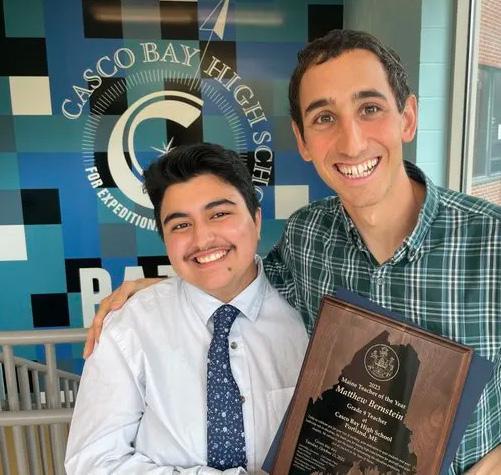
24 Maine Educator | Winter 2023
experiences.
PHOTO: Casco Bay High School grad Yusur Jasim (left) and CBHS social studies teacher Matt Bernstein share
(Photo credit Portland Public Schools)
A Conversation with the 2023 Maine Teacher of the Year
“I’m not some incredible human. I’m just a regular guy who is lucky enough to work in the best career, which is teaching, and I want people to ask me questions about teaching,” said 9th grade History teacher Matt Bernstein.
“I want them to learn in this class how they can be empowered to shape the world how they want it to be. I’m not in the business of telling kids how to think or what to think. What I want, if I’m getting it right, is kids to be empowered by learning so they can develop communication skills and critical thinking skills so they feel like they can take what they’ve learned and make their own decisions on how they show up in the community and how they want that community to be shaped,” said Bernstein.
Community at Casco Bay High School is at the center of everything staff and teachers do. It’s what Bernstein says helps make him a success and in turn his students successful.

“My favorite thing about this community is it’s under construction constantly, and the world is under construction. I’m not trying to tell them what to build but I’m trying to provide them with the tools to build what they want. It feels incredibly supportive, and I feel very much that this is a family, and like a family it doesn’t mean everything is perfect or we live in a Lucky Charms cereal box, but I know at the end of the day we all feel together,” said Bernstein.
Q&A
WITH THE TEACHER OF THE YEAR
› Why do you believe you were selected Teacher of the Year?
It is the people around me; I’m such a product of this community and particularly because most of my career has been here, I did my student teaching here and 90% of my full-time teaching here, my professional life from 21-30 years old has been here at Casco Bay High School.
I feel very grateful for the recognition and the honor, and I also want to make sure people know it’s not just-me it’s my community that deserves recognition. I wouldn’t be the teacher or person I am if not for this place.
› What advice can you offer to other educators?
Slow down and really listen.
Listening is the thing that’s most important for me, and it’s a challenge because on a daily basis in a school things happen a thousand miles an hour. There is a lot we’re trying to do-it can get easy to snowball. When I remind myself to pause and really take time to listen and be present when they’re talking and sharing sometimes that unlocks us to go deeper and learn more.
I’m trying to get through x,y,z and I’m looking at the clock and I have 7 minutes left and I didn’t get to z but a student raises their hand and asks a question-that’s where the rich learning happens, that’s what pushes us forward. So, I slow down and listen to student voice.
› What will be your platform as Teacher of the Year?
My main platform is that teaching is amazing, and I would encourage people to consider teaching; I feel really strongly about it.
We need to attract new folks to the profession. We need to get anybody who is interested in teaching in the same room as teachers who are passionate about teaching, not to sell them but to show them what we do, why we love it, why it sometimes makes us want to pull our hair out, but also why we come back every day. Teaching is hard, and we need to be honest about that, and say it can be both hard and wonderful at the same time. I really think if we can connect with people we can get more people to choose teaching as a career. If we can offer that opportunity to college kids or people who are considering changing a career to experience what it is like, I really believe a lot of people will fall in love with it.
› What is the best part of your day?
The best part of my day is not a single moment. It’s any moment of authentic connection with a kid- that’s what makes my daythat five second laugh with a kid. And… any time I’m on the soccer field with kids. It’s a shared passion. Connecting with kids is the best part of this work and the beautiful thing is they happen all the time.
MAINEEA.ORG 25
“
I want them to learn in this class how they can be empowered to shape the world how they want it to be.
”
Working For You
MEA 2022 Priorities Aim to Improve Schools & Livelihoods
Addressing Workforce Shortages Through Compensation and Certification Improvements
Lift the Minimum Wage for School Support Staff
Too many districts are struggling to recruit ed techs, bus drivers, and other critical personnel, but in many cases these shortages are exacerbated by poor pay. MEA will submit legislation and advocate for a minimum wage increase of at least 125% of the state minimum wage for all Maine educators.
$50,000
Minimum Teacher Salary, Tied to Inflation
MEA will advocate for legislation that will increase the minimum teacher salary to $50,000. As in the $40,000 increase, it is expected that any jump in the minimum may occur over time. Therefore, MEA will also push to have the minimum eventually tied to inflation so the minimum increases each year. MEA believes this legislation is crucial as the state continues to see a lack of teachers entering the profession.
Improve Certification Office Responsiveness
Pension ImprovementsRetirement with Dignity for Educators
COLA Increase to Keep Pace with Inflation
MEA will push to increase the Cost of Living Adjustment (COLA) benefit to all MainePers beneficiaries. Without an additional 6.1% ($519 million) the pension benefits of every teacher, ed tech II and III, every state employee, and every current retiree will go backward. MEA will work hard to secure improvements in the first year of the legislative session.
Lift the COLA Cap
MEA will work on legislation to lift the COLA cap, so it applies to more of our members’ pension earnings. With inflation at record levels, and costs increasing on all items, MEA will advocate for your pension to keep pace with inflation.
Long Term Disability


The current benefit package for participants in MainePers, including MEA members, lacks a long-term disability plan. MEA will advocate for the State to provide a long-term disability plan to all MainePers participants, adding this much needed protection to thousands of educators at an extremely affordable rate.
Retiree Health Care Improvements
Last year, MEA advocated and received a much-needed increase in the State share of retiree health insurance. Now, building upon our success where the state increased the amount it pays for retired teacher/ed tech health care from 45% to 55%, MEA will seek additional increases of 5% per year until the state is funding the total cost of the program for retired educators.
Response times for certification at the Maine Department of Education have improved, however with workforce shortages happening in schools all over our state, reducing wait times further will best serve students and the qualified educators hoping to work with them. MEA will advocate for additional staff at the MDOE who are dedicated to certification to not only speed up processing times but also provide greater oversight. SCAN HERE FOR THE LATEST UNDER THE DOME UPDATES
26 Maine Educator | Winter 2023
SCAN ME
Union Improvements-Increased Voice in Your Work
Access to Member Information

In too many school districts, employers are withholding basic membership information from MEA and our local associations, including contact information. MEA worked and succeeded in passing a law that asks districts to give this information to the union, that way the union can be a resource to all employees. MEA will now advocate expanding that law and instead of asking for the information require the districts to provide the information for all represented employees.
Racial Equity
MEA will work with other partners to continue to advance the cause of racial equity in Maine, including efforts to extend tribal sovereignty to Maine’s tribes, and continue to support the work of the Permanent Commission.
Student and School Improvements
Menstrual Equity
MEA will again advocate for legislation that requires all schools to provide menstrual products to all students that need them in restrooms. MEA worked on this legislation during the last session, but it failed to receive funding. MEA will continue this work this year.
School Safety
MEA is meeting with the Maine School Safety Center to learn more about how our schools can be the safest places for our staff and students. It is crucial that MEA partner with other organizations to understand and then implement the best practices in school safety. MEA will submit legislation on the issue, if necessary.
Horace Mann is committed to helping the educational community protect what’s important to them. We’re grateful for what each of you do for the future of our children. That’s why we offer special educator discounts and benefits for auto and home insurance.
MAINEEA.ORG 27
Horace Mann Insurance Company and its affiliates underwrite Horace Mann auto and home insurance. The benefits and discounts listed are only general descriptions of coverage; do not constitute a statement of contact; are subject to terms, limits and conditions of the policy contract; and may vary by state. Horace Mann Service Corporation and certain of its affiliates (Horace Mann) enter into agreements with educational associations where Horace Mann pays the association to provide services aimed at familiarizing association members with the Horace Mann brand, products or services. For more information, email your inquiry to association.relations@horacemann.com. Calling all discount lovers! CM-G41043 (Oct. 22) Auto insurance discounts: • Educator discount • MEA member discount • Affiliated credit union discount • Payroll billing discount • Advanced quote discount • Defensive driving discount Homeowner insurance discounts: • MEA member discount • Age of roof discount • Claims persistency discount • Home buyer discount • Multiline discount • Protective device discount • Discount if premiums paid by EFT • Good student discount • Multiline discount To learn more about our auto and homeowner discounts as well as our exclusive Educator Advantage® Package, contact your local Horace Mann representative today!
Recommended Books
Maine Reads
All My Rage
Pakistani American high school seniors and best friends Salahudin and Noor struggle to see a way out of their small desert town, as Sal tries to manage his family’s motel and his alcoholic father and Noor attempts to escape her controlling uncle and a miserable job at his liquor store.

Reading Age: Young Adult
The Last Mapmaker

Twelve-year-old Sai gets the chance to chart her own destiny when Mangkon's most celebrated mapmaker takes her along on an expedition to find the fabled Sunderlands.


Reading Age: Middle Grade Level


Blue: A History of the Color as Deep as the Sea and as Wide as the Sky Travel the world to explore the complex history and cultural significance of the color blue.
Reading Age: Elementary Level
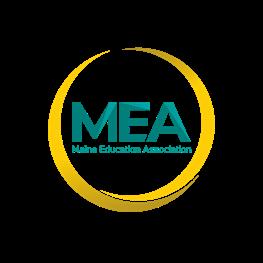
28 SCAN HERE TO SEE ADDITIONAL NEA RECOMMENDED BOOKS
SCAN ME
The Joy and Light Bus Company
By: Alexander McCall Smith

In this latest installment in the beloved No. 1 Ladies’ Detective Agency series, Mma Ramotswe is tempted to put the brakes on a business venture before it even gets rolling.
Member to Member
What I'm Reading
Below
are a collection of books educators say are helping them unwind, reading for pleasure to escape and take a break.

One Day at Fenway
By: Steve Kettmann
A cross between A Day in the Life and Moneyball—comes the inside, intertwining stories of famous, and not-so-famous people as their lives are affected by one day of baseball: August 30, 2003, Red Sox-Yankees at Fenway, during their most famous season ever.

Pachinko
By: Min Jin Lee
A New York Times Top Ten Book of the Year and National Book Award finalist, Pachinko is an "extraordinary epic" of four generations of a poor Korean immigrant family as they fight to control their destiny in 20th-century Japan (San Francisco Chronicle).

The One Hundred Years of Lenni and Margot
 By: Marianne Cronin
By: Marianne Cronin
Seventeen-year-old Lenni Pettersson lives on the Terminal Ward at the Glasgow Princess Royal Hospital. Though the teenager has been told she’s dying, she still has plenty of living to do.
MAINEEA.ORG 29
The Big Myth UMaine System Unified Accreditation:
By Paul Johnson, Professor, University of Southern Maine and Lisa Botshon, Professor UMaine Augusta

The University of Maine System (UMS) decided it needed to deliver more collaborative, marketrelevant cross-campus programming. With that goal, UMS came up with a plan to offer what’s called Unified Accreditation-unifying each of the separate accreditations on the individual universities into one state-wide institutional accreditation covering all UMS universities.
Initially, it appeared that this would be a collaborative endeavor with all seven universities in the UMaine System working with the Chancellor's office to look at the opportunities and challenges that Unified Accreditation presented.
However, three years later what the seven universities of the UMaine System have experienced is a top-down process where faculty, staff, and student concerns have been dismissed or ignored.
Here are six reasons why faculty members have found the process problematic.


1. Unified Accreditation appears to violate the legal structure of the University of Maine System which was created in 1969 by the Maine legislature, and states that there will be seven distinct universities, which will have their own distinctive academic, research, athletic (including conference and division affiliations) and extracurricular programs.
2. The consulting firm Huron, which was hired to provide its expertise with accreditation, recommends the UMaine System establish a uniform, online general education curriculum, potentially with an ed tech company.A, This proposal also violates the legal structure of the UMS.
3. Faculty members have been repeatedly excluded from important areas of planning and consultation in which they hold expertise, and, moreover, little inter-campus collaboration has been facilitated or implemented by the UMS administration. Indeed, ground-up discussions among UMS faculty groups with common interests would yield more practical ideas for cooperation.
4. It has been repeatedly stated that Unified Accreditation is necessary in order to allow students to take courses across the system. Yet, students can already do this. Similarly, one of the motivating factors for Unified Accreditation is to provide opportunities for faculty to collaborate across our universities. However, our contract already communicates the process for Cooperating Departments. What needs to be improved are our digital systems, funding, and other support for collaboration.
5. Unified Accreditation does not address the inequities that exist among the universities in the UMS, and, in fact, seems to condone hostile takeovers. The smaller campuses, which already require higher – in some cases double – teaching loads for faculty members, while providing many fewer resources, are being subsumed rather than bolstered. For example, the University of Maine at Machias has effectively been swallowed by the University of Maine, having already lost its president and, more recently, its logo and other forms of campus identity. This has resulted in less choice for students.
6. The Unified Accreditation plan has no clear means of assessment. The general paucity of data in justifying UA
underscores the lack of serious study of the possible effects that it will have on the universities, whether positive or negative, and points to the administration’s lack of concern for the sustainability of the University of Maine System’s future.
Despite the claims of the Chancellor and the Board of Trustees, Unified Accreditation in its present format will do little to improve higher education opportunities for the citizens of Maine. On the contrary, rather than providing more choice for our students, this proposed model will lead to fewer choices, fewer classes, less full-time faculty, and ultimately the loss of a number of universities in the system.
We are all in agreement that getting a university degree makes a huge difference in the lives of our students, and we are in favor of enhancing accessibility so that any Maine resident who seeks a college degree can procure one. But it is clear that Unified Accreditation is not the answer to the problems that confront the UMS. Rather it is being misused to ignore the real challenges that we face today. Unfortunately, we have little confidence that the current Unified Accreditation efforts will benefit our institutions and, most of all, the people of Maine.
30 Maine Educator | Winter 2023
Paul Johnson
Lisa Botshon
PERSPECTIVES
Dumpster Fire ��




The past few weeks have felt like a dumpster fire floating down a flooded street. This right here.... this is my favorite meme. For me, this meme really answers a whole lot of questions.
I won’t get into the details, and I'm hoping you’re all in the smooth sailing lane, but if you’re not... and you’re like me lately...This right here.... this is what it’s been like.
I love this meme so much not only because it’s definition for me is universal, but also because when things feel like a floating dumpster fire this meme makes me chuckle. Because... if when things feel that bad, a good laugh is needed.
Going into winter break, I know you’re all exhausted. I’m literally talking about dumpster fires so you know I'm straight out too...so I felt the best use of this space was to give everyone something to smile about, something that could make them laugh. I took some time read through a recent NEA social media post and found some of the funniest things kids have said in schools and compiled them here.
Here’s hoping that the New Year starts with a bang that isn’t caused by an explosion leading to another dumpster fire.
SOCIAL FEED
Giovanna Bechard Editor editor@maineea.org
Janet Lipang Sierra
Years ago I got a bob style hair cut that I thought looked so cute on me. Well, one of my sweet 2nd graders who also had a short hair cut, happily said me, “I like your hair. Now we both look like Dora the Explorer!”
Sally Merryman


The most recent one was on a day I was wearing a blue fleece vest, and one of my "wide open" students asked me why I was dressed like a Walmart employee. BTW, I'm a middle school teacher.
Jolene Manes


A student farted. To still the giggles, I stepped in and reminded the 4th graders that everyone farts. The response? “Yeah, Mrs. Manes, but not everyone whispers Bombs away! before they do!” Even I couldn’t keep a straight face then!
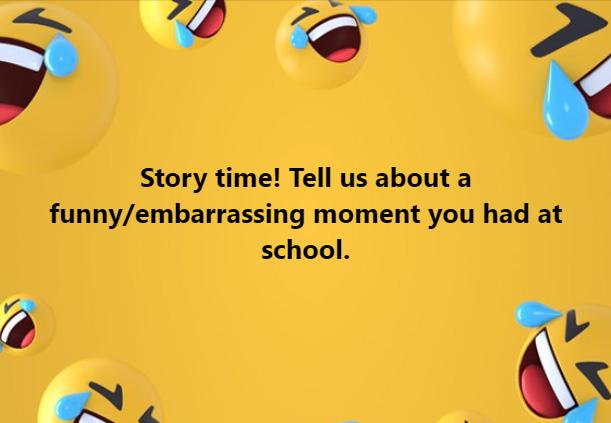

Richard Siebigteroth 5th grader:
Ran up to me at recess with a basketball stuffed under his shirt. When he got to me he said; “Look Mr.S! I’ve violated the laws of nature!”
MAINEEA.ORG 31
E DITOR'S NOTE | WINTER 2023
How was your Day? How DiD tHat plan work out? How was annoying (insert annoying person's name Here) toDay?







NON PROFIT US POSTAGE PAID AUGUSTA, ME PERMIT NO. 275
The Graduate Programs in Education at The University of Maine at Farmington Flexible. Affordable. Connected. Responsive. Offering premier Education Leadership, Special Education, and Maine’s only Early Childhood and Mathematics Education Master’s Programs. Teaching matters. Keep learning at farmington.edu/grad-studies/
Maine Education Association 35 Community Drive Augusta, ME 04330
































































 By: Marianne Cronin
By: Marianne Cronin
















